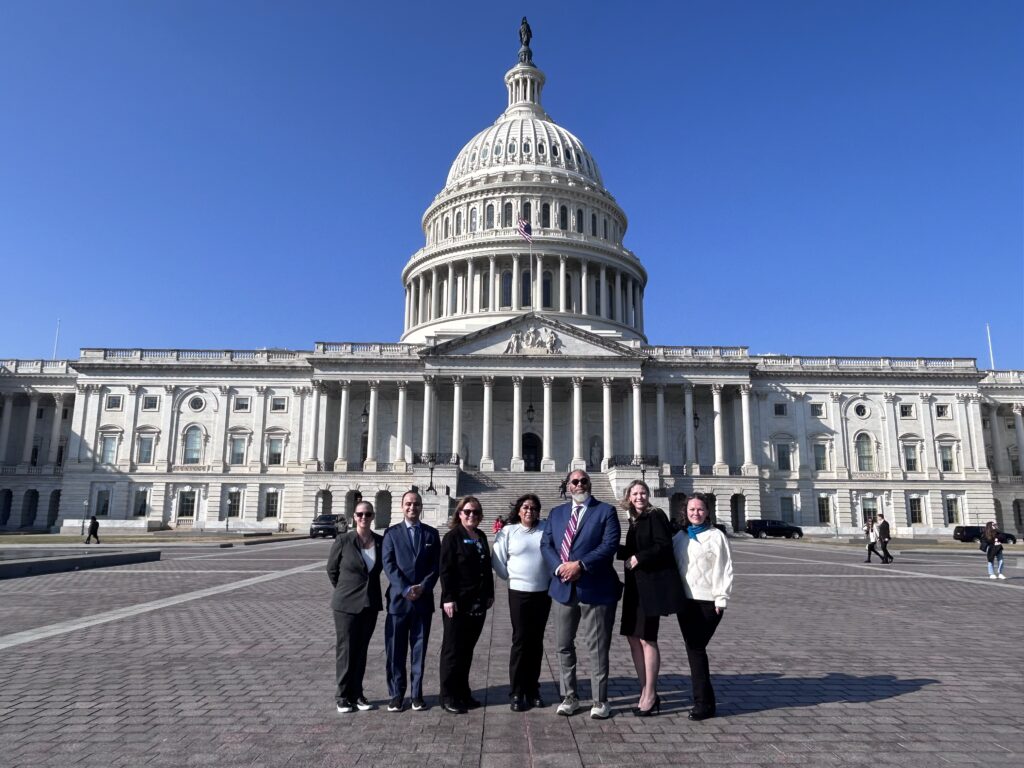
OSBA staff led a delegation of about a dozen Oregon school board members, including the OSBA Board’s executive officers, to Washington, D.C., for the National School Boards Association Advocacy and Equity Institute Feb. 2-4. Some school board members stopped for a picture before the Capitol, where they met with Oregon’s congressional delegation. (Photo courtesy of Sami Al-Abdrabbuh, OSBA Board past president)
The Advocacy and Equity Institute put on by the National School Boards Association is a regular reminder of the federal government’s connection to state and local policies. No reminder was needed this year, as a flurry of Trump administration actions have rocked the education world.
“It was everywhere, and congressional members wanted to talk to school board members about what all these potential changes look like in their school districts,” said Adrienne Anderson, OSBA legislative specialist.
The Advocacy and Equity Institute, held Feb. 2-4 in Washington, D.C., gave school board members a prime opportunity to tell them. The annual event brings school board members and their state association representatives from all over the country to the Capitol.
Anderson, who was part of Oregon’s delegation, said legislators were asking for specific examples from schools about the effects of everything from immigration policy to directives about the U.S. Department of Education. She said they were also looking for stories about how public schools benefit all students and what it would mean if funds were cut, no matter where they live, their demographics, or their socioeconomic status.
The event offers a rare opportunity for school board members to network with peers from other states while also learning about current education challenges and the best ways to advocate for their students.
Sunday and Monday presented a variety of school board-focused work sessions and presentations that ranged from artificial intelligence in education to legal and legislative updates to engaging student voices and community ideas.
The three-day event has long opened with an equity-focused preconference, but this year it was reorganized and renamed the Advocacy and Equity Institute to recognize the importance of voicing the needs of all students, especially the most marginalized.
The conference culminated with meetings with congressional members. Oregon’s delegation met with Oregon Sens. Jeff Merkley and Ron Wyden. Small groups met with each of Oregon’s six U.S. House representatives or one of their aides.
OSBA’s delegation included Haley Percell, OSBA chief legal officer and interim deputy executive director; Charissa Geib, OSBA events specialist; and nearly a dozen Oregon school board members, including all the OSBA Board executive officers.
Anderson prepped Oregon school board members to be ready to talk about five main issues:
- Fully funding the Individuals with Disabilities Education Act, which aligns with Oregon education advocates’ efforts to increase state special education funding.
- Reauthorizing the Secure Rural Schools Funding Act that provides additional federal funding for many of Oregon’s rural schools.
- Providing healthy meals at schools.
- Strengthening and protecting Title I funding for schools serving low-income families and career and technical education investments.
- Opposing school vouchers that bleed funds out of the public education system.
Board members were also encouraged to build relationships with their congressional representatives for information sharing and advocacy down the road.
“Legislators need the information and perspective we can provide, especially on issues such as school choice where people don’t realize the effect it would have on public education,” Percell said.
OSBA Board President Chris Cronin said she appreciated volunteer school board members’ willingness to take time out of busy lives to work together in D.C. to advocate for children. She urged members in Oregon to follow-up with state legislators to make connections, offer information and share their local stories.
“It’s a crazy time to be in Washington with a lot of uncertainty ahead for public education,” said Cronin, a Grant County Education Service District board member, “but from everything I experienced, I think Congress is hearing our message about what Oregon children need from the federal government.”
– Jake Arnold, OSBA
[email protected]